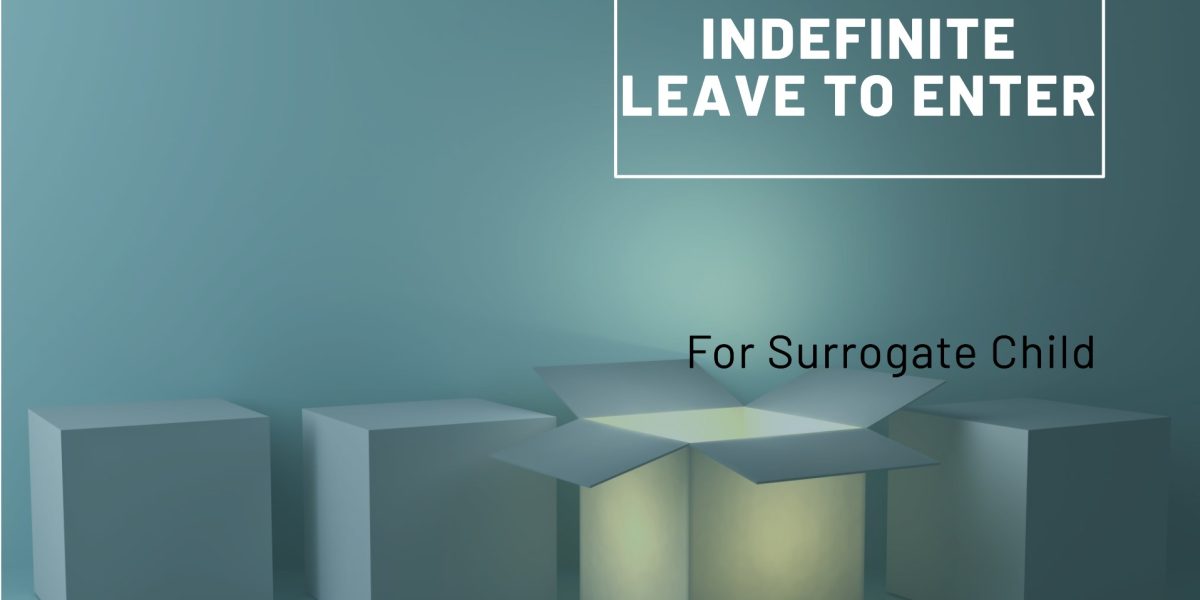The process of securing Indefinite Leave to Enter (ILE) for a surrogate child can be quite intricate, as it involves legal, biological, and immigration considerations. Surrogacy arrangements, which involve a third-party carrying a child for intended parents, can result in complex situations, especially when the child is born outside the UK. This article will provide an in-depth guide on Indefinite Leave to Enter (ILE) for a surrogate child, including eligibility criteria, the application process, and frequently asked questions.
What is Indefinite Leave to Enter (ILE)?
Indefinite Leave to Enter (ILE) is a form of permanent immigration status granted to individuals entering the UK from overseas. It allows individuals to enter and remain in the UK without time restrictions. When it comes to surrogate children, this status is especially relevant for children born outside the UK to intended parents who have used surrogacy services.
ILE for a surrogate child allows them to live permanently in the UK with their intended parents, who must be British citizens or have settled status in the country. This status provides the child with the right to stay indefinitely in the UK without having to apply for extensions or temporary visas.
Indefinite Surrogate Child Rights
The Indefinite surrogate child rights refer to the entitlements and privileges granted to a child who is born through surrogacy and has been granted Indefinite Leave to Enter (ILE) in the UK. These rights may include:
- Right to Reside: The surrogate child will have the right to reside permanently in the UK once granted ILE.
- Access to Healthcare: The child will be entitled to free healthcare through the NHS, as with any other permanent resident of the UK.
- Access to Education: The child will have access to free primary and secondary education, as well as the possibility to attend universities or vocational programs.
- No Time Limit: Unlike temporary visas, Indefinite Leave to Enter is not subject to expiration, ensuring the child’s permanent residency status in the UK.
However, the surrogate child’s rights can be contingent upon meeting specific legal and immigration requirements. The child’s biological or intended parents must ensure all documents and procedures are correctly followed to guarantee the child’s entitlement to these rights.
How to Apply for Indefinite Leave to Remain for a Child
If a surrogate child has entered the UK on a temporary visa or has been living in the UK for a period, they may be eligible to apply for Indefinite Leave to Remain (ILR) after a certain period of residency. However, the process to secure Indefinite Leave to Enter (ILE) for the surrogate child (as they first enter the UK) is slightly different.
Here is how to apply for Indefinite Leave to Remain (ILR) for a child (and consequently, the first step to ILE status):
- Eligibility: The surrogate child must have legally entered the UK under a valid visa and meet the residency requirement for applying for ILR. Typically, the child must have lived in the UK for five years before applying, although exceptions might apply.
- Complete the Application: The application for ILR (or ILE for entry) must be completed on the official UK Home Office website. The form asks for details about the child’s identity, their legal parents, and the nature of their surrogacy arrangement.
- Provide Supporting Documents: Supporting documents are crucial to proving the legitimacy of the surrogacy arrangement and the child’s entitlement to remain in the UK. These documents include:
- The child’s birth certificate.
- Surrogacy agreement or other relevant legal documentation that proves the child was born via surrogacy.
- Proof of parental responsibility for the intended parents.
- Proof of the child’s legal entry into the UK (if applicable).
- Evidence of the parents’ settled status or British citizenship.
- Submit Biometric Information: The applicant will be required to submit biometric information, such as fingerprints and photographs, as part of the application process.
- Wait for a Decision: After the application is submitted, the UK Home Office will process the application. Processing times may vary, but typically, it can take several months to receive a decision.
- Receive ILE Status or ILR: If the application is successful, the surrogate child will be granted Indefinite Leave to Enter (ILE) or Indefinite Leave to Remain (ILR) status, allowing them to stay in the UK permanently.
Requirements for Indefinite Leave to Enter (ILE) for a Surrogate Child
To apply for Indefinite Leave to Enter (ILE) for a surrogate child, there are certain requirements that must be met:
- Legal Parentage: The intended parents must have legal parental responsibility for the child. The UK Home Office will want to see evidence of legal parenthood, which may include adoption or parental orders following a surrogacy arrangement.
- Valid Surrogacy Arrangement: The surrogacy agreement should be legally recognized in the country where it took place. The parents must ensure that all legal aspects of the surrogacy arrangement are valid and recognized by both the country of birth and UK law.
- Proof of British Citizenship or Settled Status: The intended parents must be British citizens or have settled status in the UK. Without this, the application for Indefinite Leave to Enter is unlikely to succeed.
- Child’s Dependency: The child must be dependent on the parents, both financially and emotionally. The parents must demonstrate that they will be able to support the child in the UK without relying on public funds.
- Financial Stability: The intended parents must prove they can financially support the surrogate child once they enter the UK, ensuring the child’s well-being and security in the UK.
- Health and Character: Like most immigration applications, the child’s health and character will be assessed. If the child has any criminal convictions or health issues that would require excessive public funding, this could affect the outcome of the application.
FAQ About Indefinite Leave to Enter (ILE) for a Surrogate Child
- What is Indefinite Leave to Enter (ILE) for a surrogate child?
Indefinite Leave to Enter (ILE) allows a surrogate child who has been born overseas to enter and remain permanently in the UK with their intended parents. It grants the child the right to live, work, and study in the UK without any time limitations. - What documents are needed to apply for ILE for a surrogate child?
You will need the child’s birth certificate, a legal surrogacy agreement, proof of parental responsibility, financial documents to show you can support the child, and evidence of your British citizenship or settled status in the UK. - How do I apply for Indefinite Leave to Enter for my surrogate child?
To apply for ILE, you must complete an application via the UK Home Office, submit supporting documentation, and possibly provide biometric data. The process also involves proving that the child is legally your dependent and that you are financially stable. - Can a surrogate child be granted Indefinite Leave to Enter without a parental order?
A parental order or a valid surrogacy agreement may be required to prove parental responsibility. Without such orders, the surrogate child may not be recognized as legally your child, affecting your ability to secure ILE for the child. - How long does it take to process the ILE application for a surrogate child?
The processing time can vary, but it generally takes several months. It’s important to submit a well-documented application to avoid delays in the decision. - Can I apply for Indefinite Leave to Remain (ILR) for my surrogate child?
Yes, after living in the UK for a certain period (usually five years), your surrogate child may be eligible to apply for Indefinite Leave to Remain (ILR), which will further solidify their right to live in the UK permanently.
Conclusion
The process of securing Indefinite Leave to Enter (ILE) for a surrogate child can be complex, but it is an essential step for ensuring that a surrogate child can live permanently with their intended parents in the UK. Understanding the requirements, application process, and necessary documentation is crucial for a successful application. With the right preparation, intended parents can navigate this process and provide their surrogate children with the opportunity to thrive in the UK.
More information visahotspot












